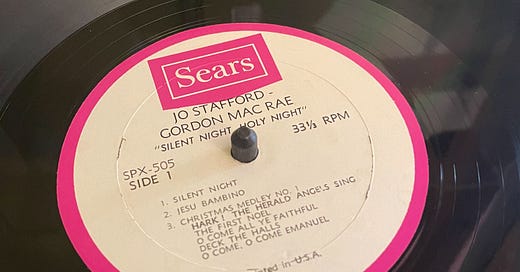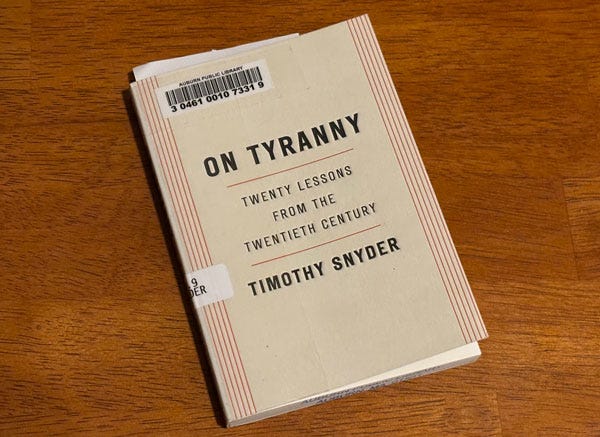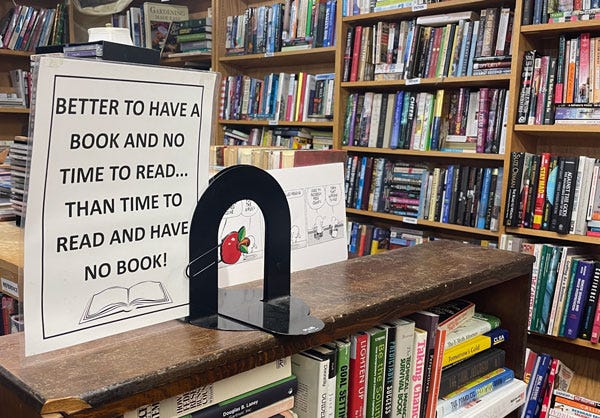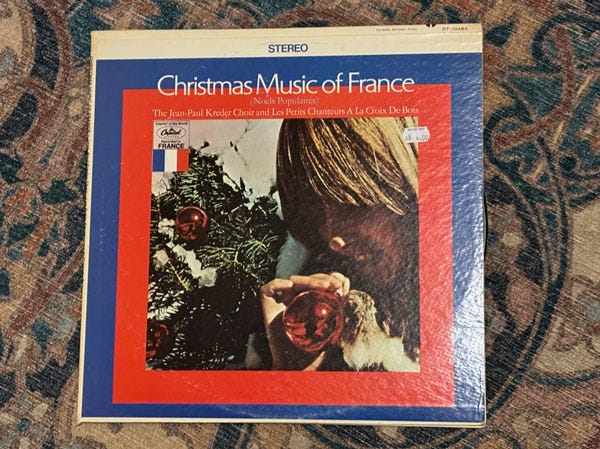To Have and to Hold
Praising physical books and music and why that may be increasingly important because of U.S. politics
Welcome to another edition of Willoughby Hills!
This newsletter explores topics like history, culture, work, urbanism, transportation, travel, agriculture, self-sufficiency, and more.
It’s been a few weeks since I stumbled upon Timothy Snyder’s wonderful and concise book On Tyranny: Twenty Lessons from the Twentieth Century, yet I keep returning to some of the ideas in my mind. I cited the book a few weeks ago in this newsletter, discussing the importance of making eye contact and small talk.
The past few days, I’ve been thinking about Snyder’s advice to “Be kind to our language.” To Snyder, this means avoiding using the words and phrases of others to allow for free thought. It also means avoiding consuming television news, which often oversimplifies concepts, lacks critical context, and in Snyder’s telling, can be trance inducing.
He goes on to say:
“Staring at screens is perhaps unavoidable, but the two-dimensional world makes little sense unless we can draw upon a mental armory that we have developed somewhere else. When we repeat the same words and phrases that appear in the daily media, we accept the absence of a larger framework. To have such a framework requires more concepts, and having more concepts requires reading. So get the screens out of your room and surround yourself with books.”
Even before reading the above passage, I seemed to be instinctively following this advice for the last year or two. Seeing Snyder articulate it so clearly helped solidify the idea in my head even more.
My interpretation of Snyder’s advice is to hold physical books, feel them in your hands, and to turn their pages, rather than reading the same text on a Kindle or similar device. I have been feeling for a while now that our over-reliance on digital technology for consumption of books, magazines, newspapers, music, and movies has led to a disconnect within us.
I was a big Kindle fan when they first came out. I loved the ease of traveling with dozens of books at a time, in a device that fit in my pocket. At some point, though, I realized that I was retaining much less of what I read and I wasn’t engaged with the texts in the same way. I honestly don’t even know where my Kindle is right now or the last time it was charged.
But there’s even a bigger reason that I think it’s more important than ever to lean into physical media.
To quote again from Snyder, he also shares the lesson “Do not obey in advance.” Here’s how he defines it:
“Most of the power of authoritarianism is freely given. In times like these, individuals think ahead about what a more repressive government will want, and then offer themselves without being asked. A citizen who adapts in this way is teaching power what it can do.”
I am expecting self-censorship in the publishing space will become a bigger issue. We’re already seeing book bans spreading to libraries around the country. Books that cover topics seen as a threat to the white supremacist status quo are being made harder to find and read- anything that covers the repressive history of the U.S., or looks at issues around race, gender, queerness, or labor struggles, for example.
Obeying in advance via self-censorship starts at the author level, with writers giving a second thought to their words for fear or retribution. Editors may also be more careful about what makes it to print. In a larger sense, I imagine that book publishers will also become more cautious about the books they choose to green light. After all, publishers are ultimately businesses with the goal of making money. They are not in business as a public service, to spotlight underrepresented voices, or to make sure truths are known.
As in any industry, publishing is offering what Austin Frerick described on my podcast as “the illusion of choice.” You may not even pay much attention to who published the book you’re reading, but if you look closely, you’ll realize that many imprints are actually part of a much larger publishing house.
For example, Penguin Random House has more than 300 different imprints. More than 90% of publishing is controlled by the “Big Five:” Penguin Random House, Simon & Schuster, HarperCollins Publishers, Hachette Book Group and Macmillan. Penguin Random House attempted a merger with Simon & Schuster in 2022 that was ultimately blocked by a federal judge as anti-competitive, but the publishing space is still very consolidated.
In a conservative political environment, one led by somebody who is outspoken about people with whom he disagrees and promises retribution, it’s easy to imagine the leadership of these publishers being unwilling to take the risk on anything too controversial or that could “poke the bear” of the administration.
Even if a book does make it to publication, it’s easy to imagine other parts of our “publishing industrial complex” would also obey in advance, perhaps refusing to distribute or circulate controversial books. This might happen with everyone from large booksellers like Barnes and Noble to librarians that don’t want to spark local backlash.
Ultimately, that means less access to reading material for you and me.
Perhaps that’s why over the last year or two, I find myself gravitating more and more to physical media of all kinds. There’s a certain “thrill of the hunt” aspect that comes from browsing used book stores, record stores, thrift stores, garage sales, and the like which is hard to replicate with an algorithm.
We recently attended a book sale organized by local Palestinian organizations to benefit relief in Lebanon. Tables of used books filled a local community room, with a suggested donation requested.
I loaded up on several interesting titles, everything from works by Ralph Waldo Emerson to more contemporary political books. One book that really caught my eye was called A Better Place to Live: Reshaping the American Suburb. It was published in 1994 and was written by Philip Langdon.
Langdon also wrote one of the best books about roadside Americana, Orange Roofs and Golden Arches, published in 1986. I’ve cited that book in my newsletter a few times, so I was excited when I unexpectedly saw his name on a book for sale.
A Better Place to Live was a good read. Much of it is based on the New Urbanism movement, which attempted to transpose lessons from classic cities and small towns to more suburban settings. I first started learning about New Urbanist principles nearly twenty years ago, and they have greatly influenced how I think about the places we live (just look at my constant pleas for better sidewalks!)
Amazon’s algorithm would never recommend an out of print, 30 year old book to me. I would never have thought to seek it out on my own. But there it was on a table at a book sale calling to me and I took it home and devoured it. It was exactly what I needed!
Most importantly, that book sits on my personal library shelf now, and it can’t be taken away by the whims of a corporation (as can happen with ebooks).
I feel a similar pull to physical media with music and movies lately. I’ve started really taking pleasure in putting on a vinyl record and having it play in the background when I’m home.
As with books, when it comes to physical records, I can find myself leaning into eclectic choices that an algorithm might never offer me.
For years, I’ve had a record in my collection called Milton Page Plays the Pipe Organ for Christmas. My copy still has the $1 price sticker on it from whatever thrift store or garage sale I purchased it years ago. I decided to play it the other day and it was delightful!
I was expecting heavy church organ music, but instead, it was practically whimsical and felt much lighter. It reminded me more of the music that plays on merry go rounds in an amusement park or even the organ at a baseball game. It’s unlike anything else I listen to and brought me some unexpected joy.
I was in a record store over the weekend and decided to purchase an equally odd choice: a record called Christmas Music of France. I had no idea what to expect. This one was more choral and religious, all sung in French. It was equally delightful, but again, nothing like what I usually listen to.
At this time of year, we’re all sharing our Spotify Wrapped playlists. Mine is heavily skewed by my kids’ listening choices, but it also feels strangely hollow and one-dimensional. I don’t feel like the Spotify algorithm quite gets me or ever really suggests what I want. It can’t anticipate that I might want whimsical organ one minute and French choral the next. The organ album appears to be on Spotify, but the French record doesn’t even appear to have been digitized!
As I’ve written about plenty of times in this newsletter, I am on a journey which seems to find me severing ties with as many large businesses as possible, especially when they control aspects of our lives or our economy too heavily. I gave up Amazon Prime a few months ago and don’t miss it. I no longer subscribe to any video streaming services. I purchase as much of my food directly from the farmer as I can, avoiding both big food companies and big grocery chains.
Perhaps building a library of old books, vinyl records, and DVDs is just another logical step in that same direction. As the political climate in the U.S. continues to shift, I have a feeling that leaning into the physical world over the digital world in all aspects of our lives will become increasingly important.
(And yes, I understand the irony that I’m writing this and sharing it with you on a digital platform. What can I say? Humans are complicated.)
Thanks for reading Willoughby Hills! Subscribe for free to receive new posts and support my work.
Related Reading
Kindness Will Save Us from The Twilight Zone
If you’ve missed past issues of this newsletter, they are available to read here.










Yep, great read. I don't know if I'm as drawn to physical media as you (other than books) because I don't like HAVING too many things, but I certainly empathize with the sentiment.
Oh, yes to all of this! I've noticed that one of the biggest drawbacks to streaming music platforms is that there's no way to give music to someone as a gift anymore. I used to love buying albums for my family and friends to share new artists with them, but how do you do that on Spotify?! Of course you can send a screenshot, but it's not the same - and if the person actually does listen to the song you suggested, the algorithm tends to then steer them back to their usual listening habits.
Jon Caramanica has talked about "nostalgia for the physicality of an album," but I think it's about more than just the physical aspect, it's also the notion of an album itself: how artists would spend time thinking about which songs fit together, trimming their record down to the 12 or 13 best tracks, deciding on the order, hiding a secret track at the end of a CD... So much of that artistry has been lost now due to streaming.
And about the influence of publishers, have you listened to the podcast "Sold a Story" from APM Reports? It's mainly about how American schools veered away from phonics in reading instruction and the catastrophic consequences, but some of the later episodes touch on the impact one academic publisher had on how reading was taught in the US for decades. You're so right that it's a business, and what gets out into the world depends more on what publishers choose to print than what writers choose to write.